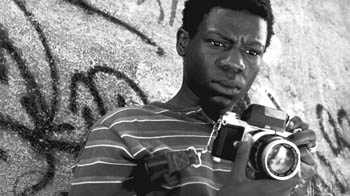![[Metroactive Movies]](/movies/gifs/movies468.gif)
[ Movies Index | Show Times | Silicon Valley | Metroactive Home | Archives ]
|
Buy
the 'City of God' soundtrack.
|

Shutter to Think: Alexandre Rodrigues tries to snap his way out of the harsh reality of the Rio slums. Bad Fellas 'City of God' trumps 'Gangs of New York' as a study of a hell-bound slum MAYBE WE need a point of comparison to get past the hype and see how essentially candy-coated Gangs of New York is. Consider, then, the notorious Brazilian import City of God, made by Scorsesean disciples Kátia Lund and Fernando Meirelles and shot in the wickedest slums of Rio de Janeiro. Like Gangs of New York, it tells of a conflict between two rivals, although without the windiness and romantic subplot. The film, which chronicles the brutal life of children as they grow into violent gang members in a maze of tenements even the police are afraid of, is superfast and hypertextual. One camera setup takes us, in about four minutes, through nearly 15 years in the life of one slum apartment. Yet the story ends and begins at the same point, with the camera-toting hero, Rocket (Alexandre Rodrigues), at the point of his death. Like the fleeing chicken in the now-famous opening, he's caught between two forces: a new gang lord named Mane Galinha (called "Knockout Ned" in English and played by Seu Jorge), and his psychotic opponent, a dentally impaired psycho named Little Joe (the nightmarish Leandro Firmino da Hora). It's Joe who stays with you. In his childhood, he is a shirt-tail friend of Rocket's; he outlives the rest of the gang because he's too bloodthirsty to die. Like Edward G. Robinson's Little Caesar, Little Joe comes across all the worse because he doesn't realize he's gay. This isn't the same thing as a character being a gay villain; rather, it's the situation of a bad man trying to be the worst man possible because he fears his own unmanliness. When Little Joe becomes the boss of the slum, he initiates a reign of terror, but it is a reign--in his own horrible fashion, he keeps some kind of peace, even if it means shooting children. Meirelles makes TV commercials, which you'd realize automatically from the bravura opening sequence of a chicken running for its life through the middle of a gang skirmish. The problem with TV commercials is that they fix an image, but they don't deepen it; they're meant to be swallowed whole. You can watch and rewatch commercials because they all race by so quickly that they're forgotten the instant they're over. Moreover, there's not a lot in City of God to interest people interested in women, which is the flaw of so many Scorsesean films, even films with this terrific level of technical virtuosity. These kinds of movies consist of nothing but bells and whistles; the filmmaking prowess often brings out the kid in the male animal. City of God isn't a classic, but it does provide a fantastic ride. And it offers a belief in some kind of justice, despite the police's inability to calm the hideous violence we see in this Brazilian ghetto. But the success Rocket achieves as a news photographer is almost passed over because of the speed of the story. His new job provides an irony the filmmakers overlook: the true obscenity of City of God is that these people who dwell here are so poor that all they can sell are images of their own suffering.
City of God (R; 130 min.), directed by Kátia Lund and Fernando Meirelles, written by Paulo Lins and Bráulio Mantovani, photographed by César Charlone and starring Alexandre Rodrigues and Leandro Fermino da Hora, opens Friday at Camera 7 in Campbell and the Aquarius in Palo Alto.
Send a letter to the editor about this story to letters@metronews.com. [ Silicon Valley | Metroactive Home | Archives ]
|
From the March 6-12, 2003 issue of Metro, Silicon Valley's Weekly Newspaper.
Copyright © Metro Publishing Inc. Metroactive is affiliated with the Boulevards Network.
For more information about the San Jose/Silicon Valley area, visit sanjose.com.